UPDATE Cctober 11, 2012: On Oct. 8, Leymah Gbowee resigned as head of Liberia’s Truth and Reconciliation Commission criticizing President Ellen Johnson Sirleaf.
By Stacey Gualandi/October 14, 2011
It is not every day that one gets to meet a Nobel Peace Prize winner. I had the good fortune to attend a Library Foundation of Los Angeles book signing event recently with Leymah Roberta Gbowee, the Liberian peace activist known for organizing a courageous protest of her nation’s civil war in 2003. After hearing her speak, it came as no surprise that four days later, she would add the Nobel Peace Prize to her growing list of accomplishments.
[youtube=https://www.youtube.com/watch?v=cfNmKrz3yQM]
The 39-year-old Gbowee, along with Liberian President Ellen Johnson- Sirleaf and Yemeni human rights leader Tawakul Karman, received the Nobel for her “non-violent struggle for the safety of women and for women’s rights to full participation in peace-building work” in her nation of Liberia.
The Nobel citation said, “We cannot achieve democracy and lasting peace in the world unless women obtain the same opportunities as men to influence developments at all levels of society.”
In 2003, Gbowee famously organized hundreds of Christian and Muslim women to dress in white and hold daily protests of their nation’s ongoing civil war. The women even imposed a “sex strike” to end the continuing violence. She was instrumental in forcing then-President Charles Taylor into peace talks, eventually ending the war, and ultimately leading to the election of Johnson-Sirleaf, the first democratically-elected female Liberia president.
Gbowee, who now works for the Ghana-based Women Peace and Security Network Africa (WIPSEN-Africa), was praised for organizing “women across ethnic and religious dividing lines to bring an end to the long war in Liberia, and to ensure women’s participation in elections. She has since worked to enhance the influence of women in West Africa during and after war.”
Gbowee heard the news while flying to New York to promote her book “Mighty Be Our Powers.” She says she was numb and overwhelmed, adding, “Everything I did, I never thought about greatness … or any reward for it. All I’ve done is … acts of survival; acts of helping people get out of their desperate state; acts of bringing the needs and concerns of women to the forefront. I never thought it would lead to this.”
Gbowee told Reuters News Agency that “my work is for survival, for myself, and for other women. With or without a Nobel, I will still do what I do because I am a symbol of hope in my community, on the continent, in a place where there is little to be hopeful for.”
Gbowee and her “freedom movement” came to prominence in the 2008 documentary “Pray the Devil Back to Hell” by filmmaker Abigail E. Disney, the grand-niece of Walt Disney. When Leonard Riggio, the chairman of Barnes & Noble, saw the film, he made the unusual choice to personally finance an eight city tour for Gbowee’s book. “Mighty Be Our Powers”, written with Los Angeles-based journalist Carol Mithers, is about her life fighting for peace in war-torn Liberia.
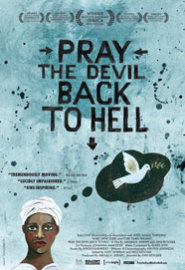 The award-winning documentary makes its U.S broadcast debut October 18th as part of a five night series “Women War & Peace” on PBS. The Los Angeles Times’ review says, “The films and the series…shiver with the tension of humanity at its worst and humanity at its best. As the stories unfold, we peer into the depths of depravity only to rise, on the shoulders of these women, to the promise of survival…”
The award-winning documentary makes its U.S broadcast debut October 18th as part of a five night series “Women War & Peace” on PBS. The Los Angeles Times’ review says, “The films and the series…shiver with the tension of humanity at its worst and humanity at its best. As the stories unfold, we peer into the depths of depravity only to rise, on the shoulders of these women, to the promise of survival…”
You may not know about this extraordinary woman-turned-nation builder, but once you hear Gbowee’s story like I did that evening — how she stood up to warlords and a dictator — you will understand why she is now a Nobel Prize winner.
The following are highlights of Reverend Dr. Gwynne Guibord’s interview with Gbowee at the LA Public Library’s ALOUD event.
[vimeo http://www.vimeo.com/30118633 w=480&h=415]
ON LIVING WITH FEAR IN LIBERIA:
I was a child when the war started – a teenager who had been protected by her family and her community, and you wake up one morning and it’s all gone. There is the sound of the gun; the absence of your parents; the absence of your siblings; relatives telling you the horrors. The fear is never ending.
At that point, the peace starts to go away and as it progresses, you are praying that this madness will end. Each day you wake up and it’s worse than the day before. Beyond the issue of fear, you have the issue of violence. One issue after another and that fear pushes you back into a space that is difficult to describe. You are afraid.
It takes hope and courage; it takes a lot away from you day by day and most of the time people will bring terror on other people. That’s what they want — to gradually strip you of your strength, your willpower, everything that you would need to be able to fight back. I lost faith, so it was difficult for me to pray.
HER TRAINING MANUAL FOR WOMEN:
It’s a very powerful tool for women. It reaffirms who you are as a woman. We ask them to describe themselves…to reaffirm their beauty. They say it never felt so good. Many women never ever took the time to compliment themselves.
Sometimes the women are too busy, and men never stopped to look at them and say “you look good.” One of the things I do to myself all the time is to stand in front of a mirror and say “you look good.” Haha! We try to teach our women to appreciate themselves.
[youtube=https://www.youtube.com/watch?v=Uon9CcoHgwA]
HER DREAM IN 2003:
I lived by myself and would sleep on the cold floor – something you pick up in war time because you are afraid to sleep on the bed for fear of stray bullets. Lying there, I always hear this voice in my dream, I never see the face, but I was told to “gather the women and bring them together to pray for peace.”
That was the beginning of the Christian Women Peace Initiative, and then Muslim women were inspired to start their own group. This began the entire process that led us to the protests in 2003.
ON CHRISTIAN AND MUSLIM WOMEN PARTNERSHIP:
When we brought these women together, we knew we had to move beyond religion, ethnicity, and political ideologies. We had to bring it to a place where it was about womanhood. Women from the Bible and the Koran put their faces in the forefront of the politics of their time.
Research that I found on the Islamist perspective on non-violence and the Christian perspective on non-violence, I exploited to the core. By the time we decided to do the fast it had caught on. We wore white (in protest) as symbolic of peace. No shoes. No makeup. We protested for two years.
SEX STRIKE:
We had started this thing and our men, in the press, in public, etc., were being silent. We needed to move them to action. A sex strike. Deny them sex. In the urban area we failed miserably. Ha. We were fasting and praying. It’s about denying ourselves pleasures. As we take this journey it means no sex. The men agreed.
For months… nothing. When we ended the protest after two years, in the rural community, we saw men with gifts and flowers. And they came to appreciate their wives publicly. We caught the attention of the media and the men.
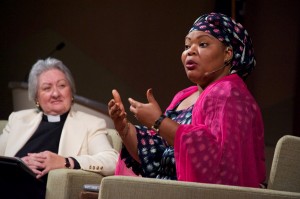
ON FINDING HER POWER IN 2005:
We seized the Peace Hall. The police came and they said you are obstructing justice. I totally went off. I had been brought up to believe that men in this world were supposed to protect women and children.
And if I’m being accused of obstructing justice and all I’m trying to do is deliver a semblance of justice to my people, I felt like there is no hope. It was unbelievable depth of humiliation. So I said I’ll make it easy for you. I’ll strip naked. I was protesting the pain of every woman. When you are being raped, your clothes are torn off you.
When you are protesting in pain, you are giving away the last shred of your integrity and that is what I was doing in protest. Take what is left of womanhood for every Liberian woman if this will bring peace then take it!
But the security men who came to arrest us, understanding the African culture, they run. It turned it around 100% for us. When they negotiated with us to leave that place, we understood that we too had power. In three weeks, a peace agreement was signed.
ON SACRIFICE:
I’m at a place where now all I want is the opportunity to do my work, do what I know to do best, to encourage people to maximize their potential. I don’t think I’ve made any sacrifice. I just lived. The pains that I’ve gone through… I see it as my empowerment phase.
I try to ask people to kindly say that I am a mother of six, which gives me such pleasure, and a peace and women’s rights activist. I don’t want to be President of Liberia; I’m just content working in my community, being content with what God has called me to do.
I don’t begrudge Him for any of the trials I have gone through in life. I don’t see any of the achievements that I’ve gotten as a right. I see it as God’s favor.
###
My thanks to the Library Foundation of Los Angeles for the opportunity to meet this one-woman liberator. I can’t wait to read her book, “Mighty Be Our Powers.”Her work is far from over. Leymah Gbowee is back in her home country now witnessing the election process for president of Liberia that is taking place this week.
Credit for Lead Photo: Gary Leonard
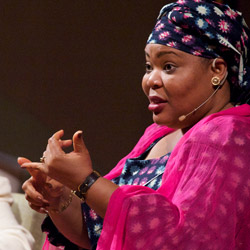
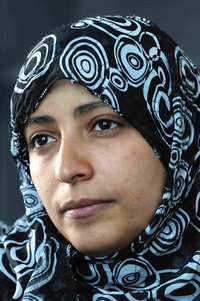

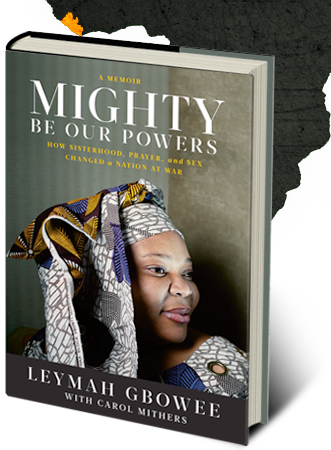


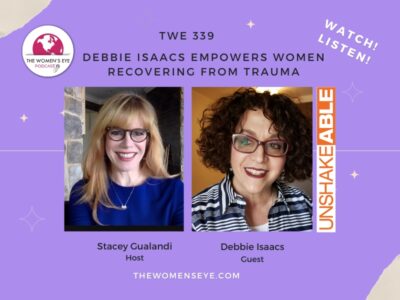
Leave a Reply